Pavlovsk Park Pavlovsk Palace Architect –

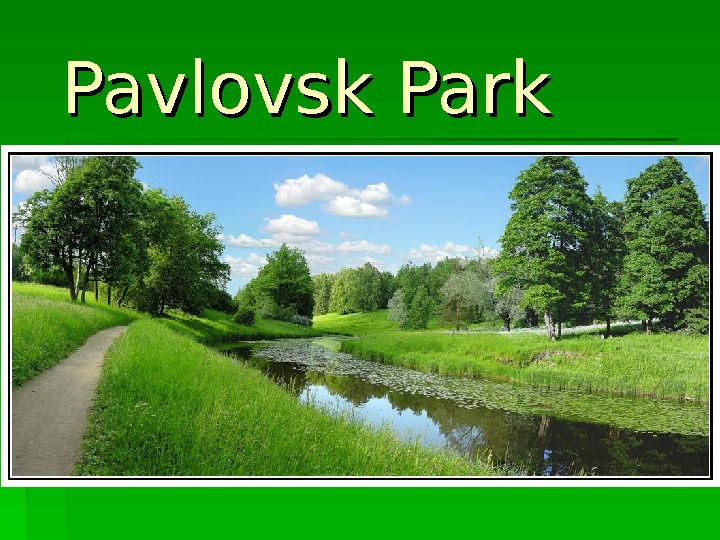
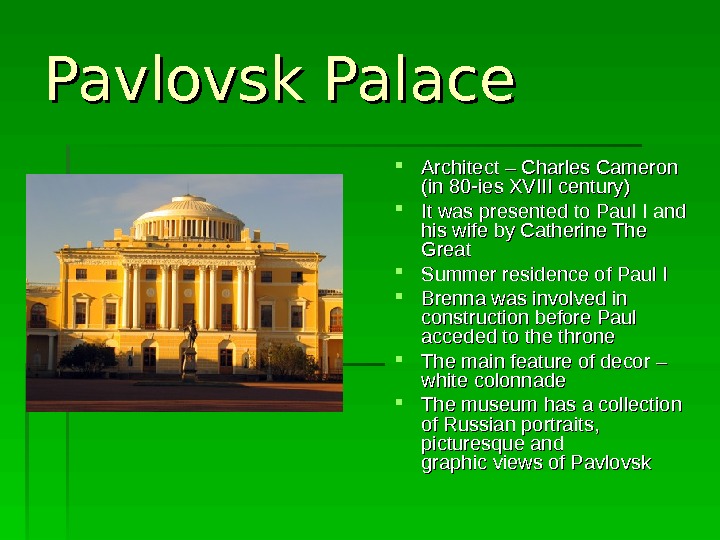
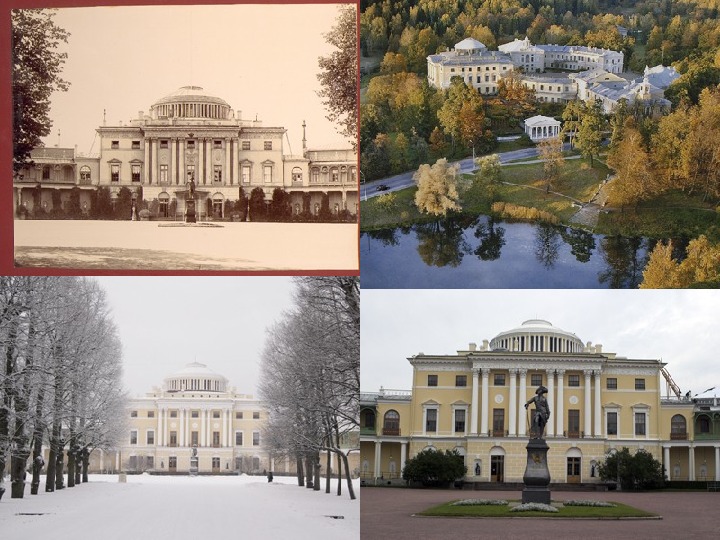
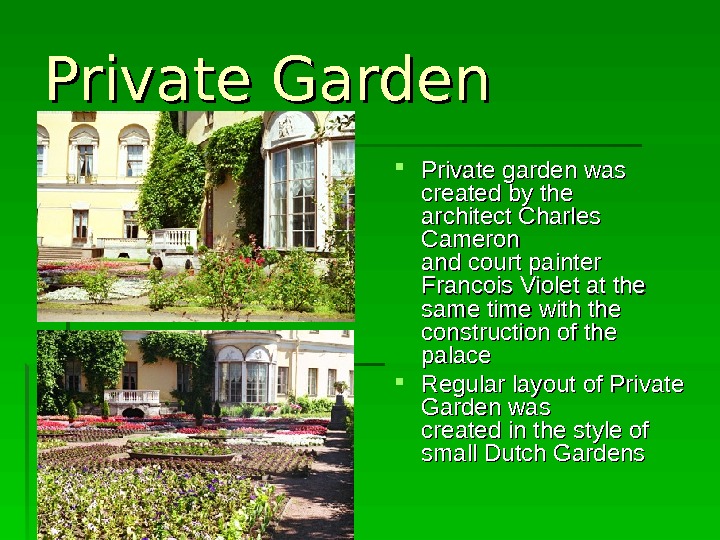
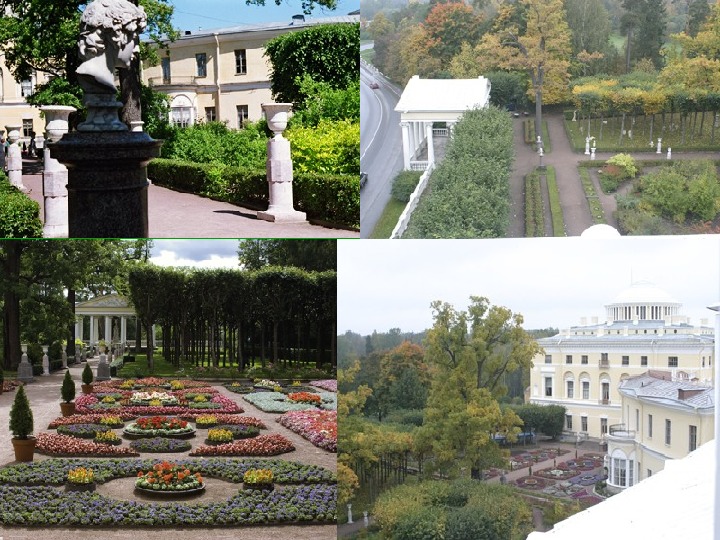

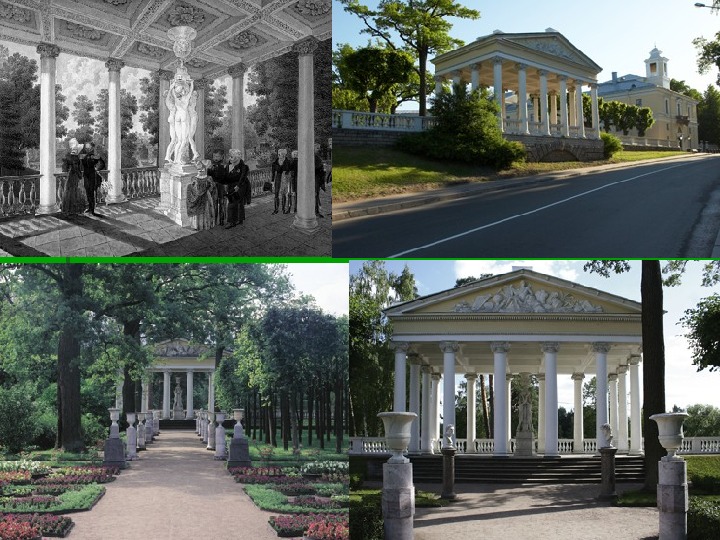
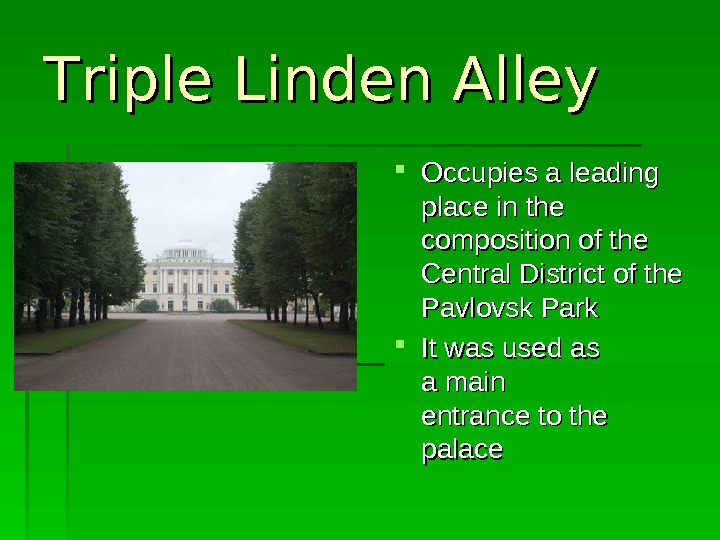
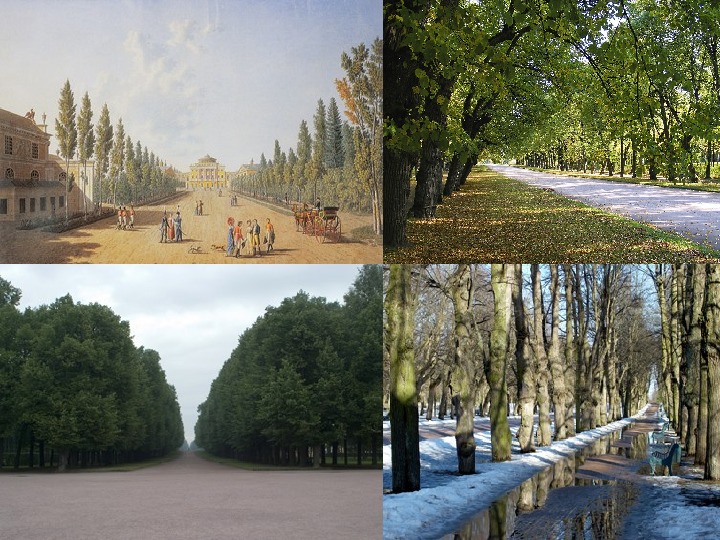
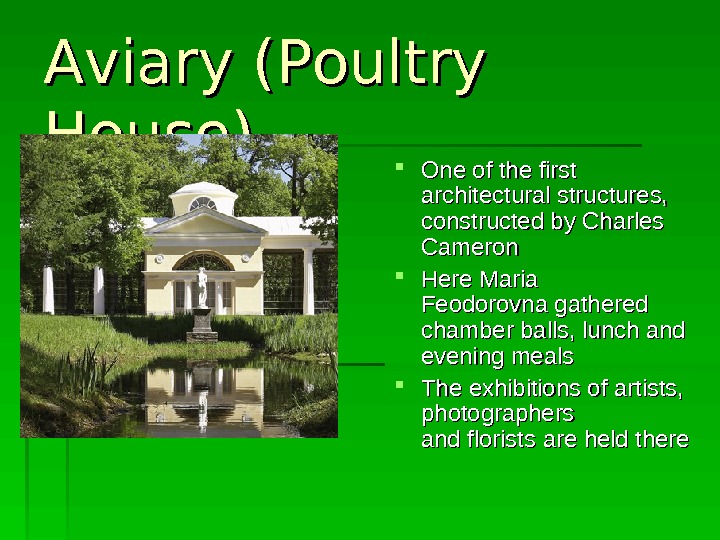
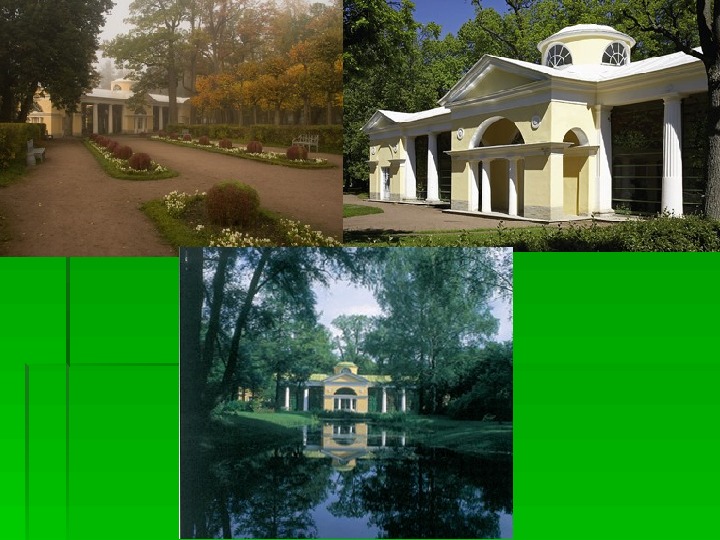
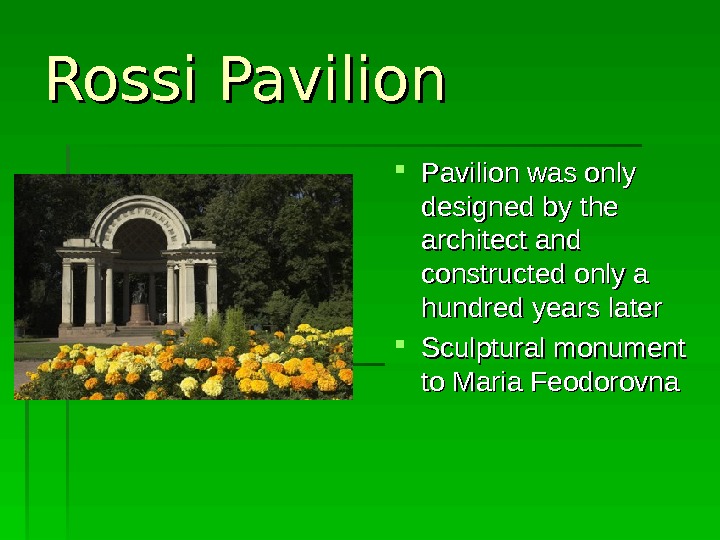
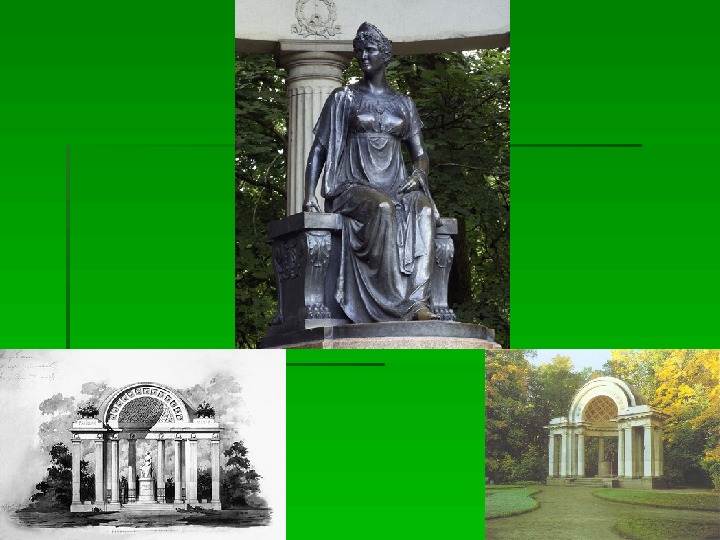
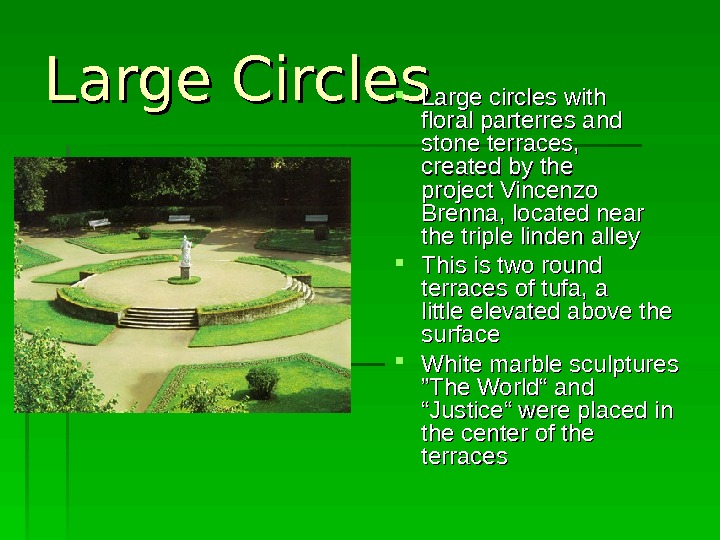
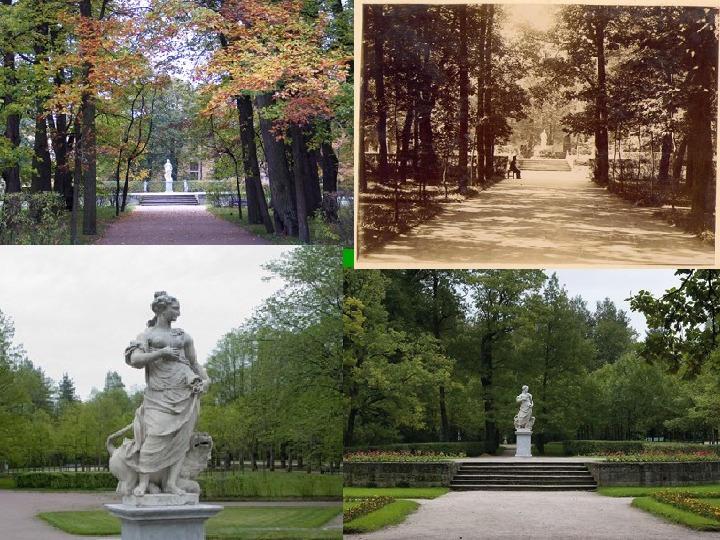
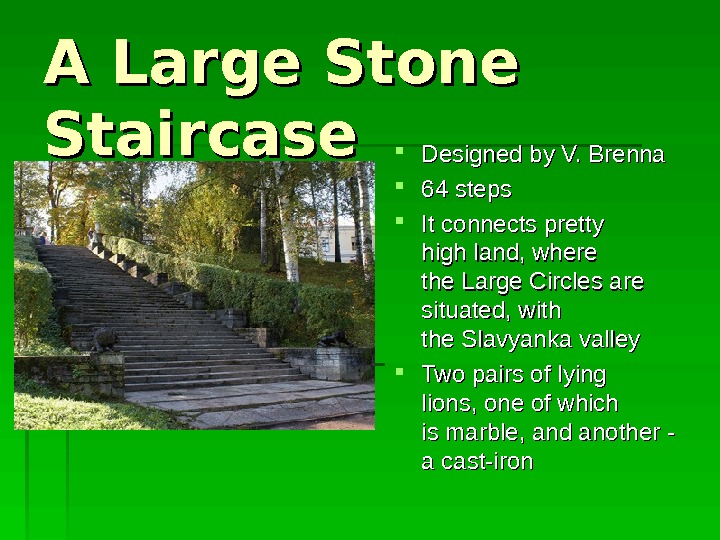
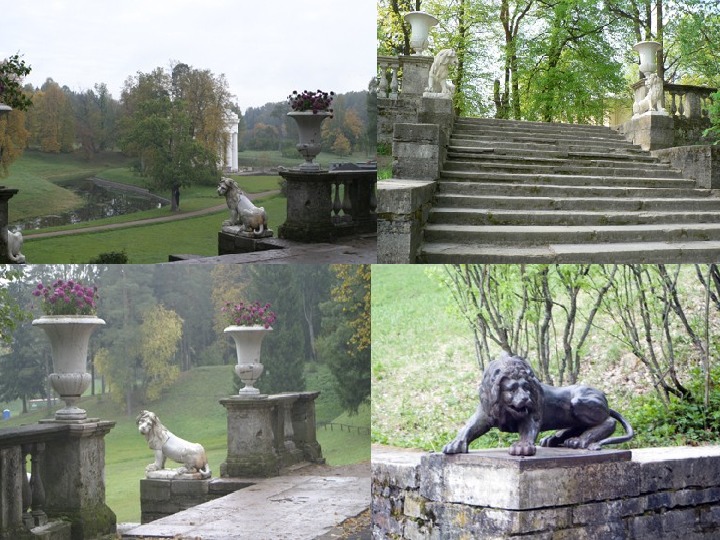
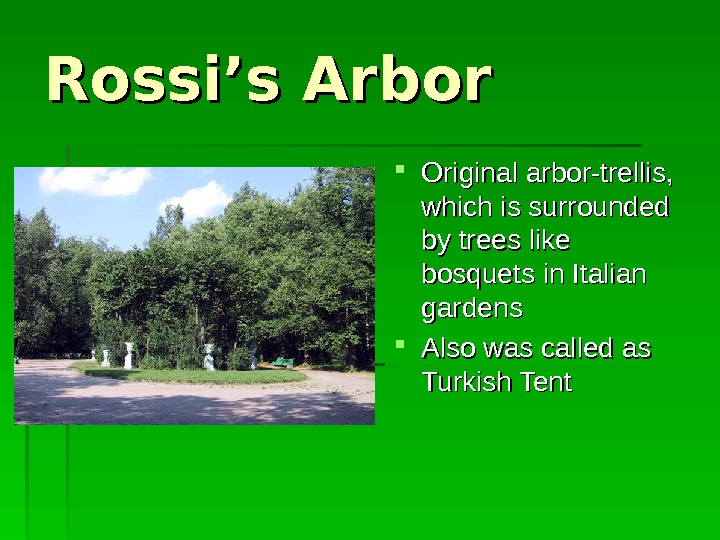
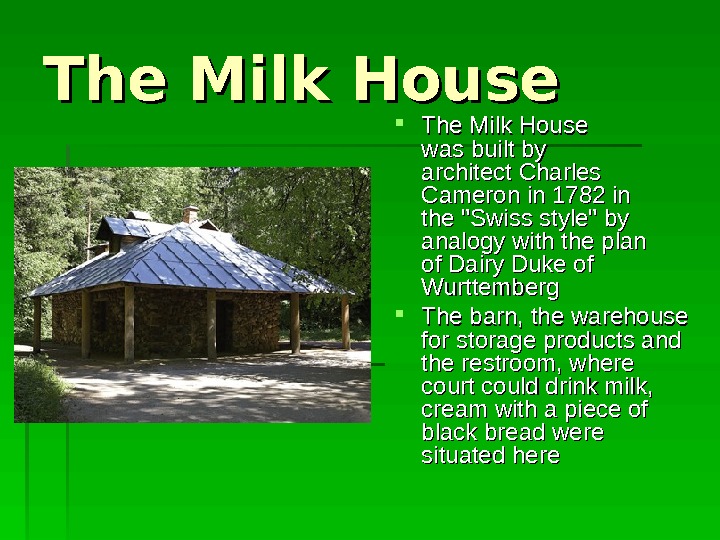
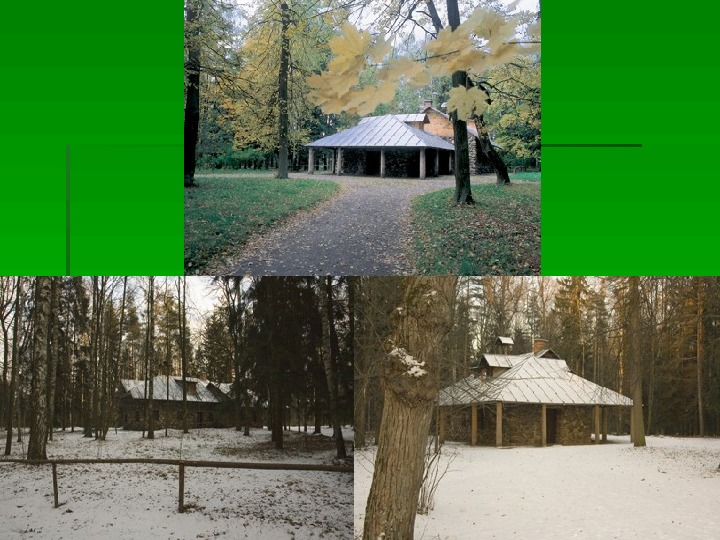
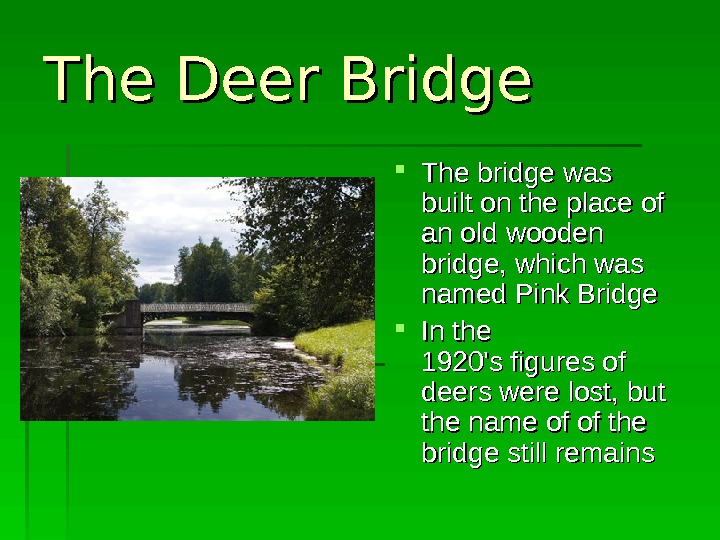

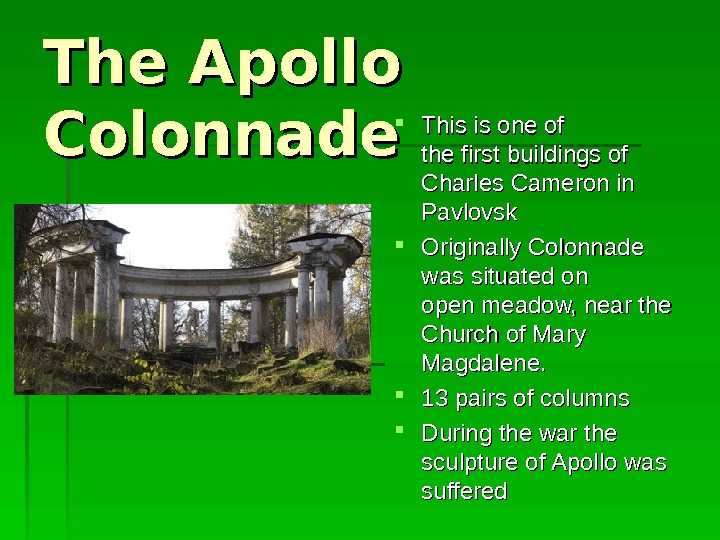
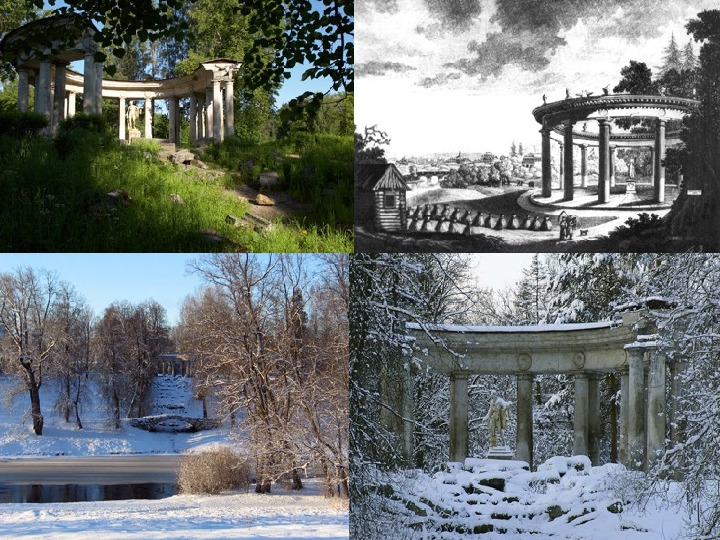
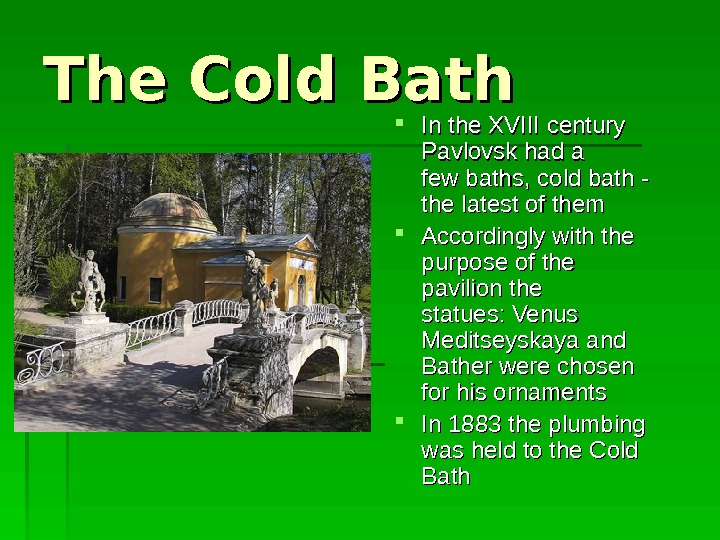
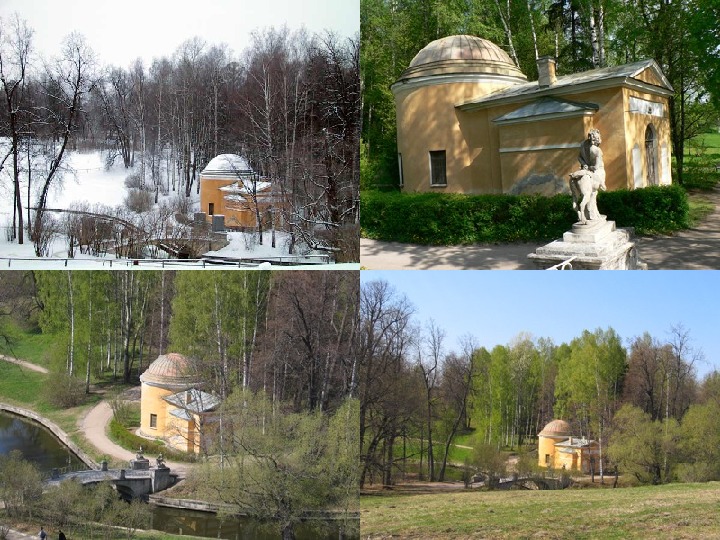
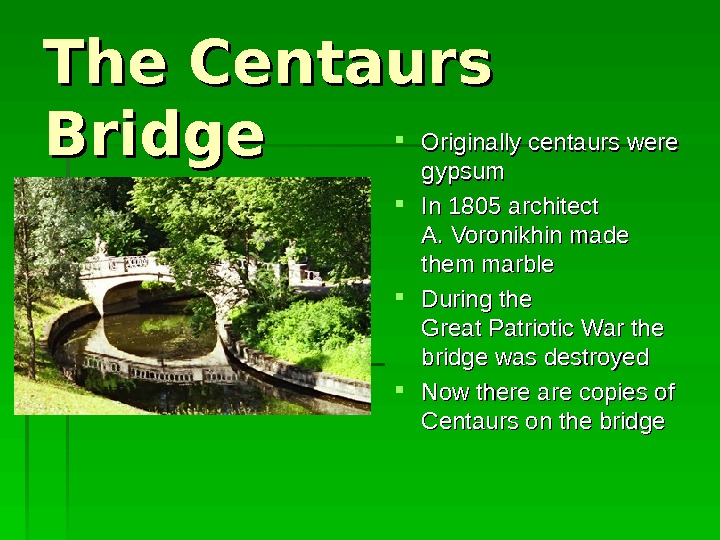
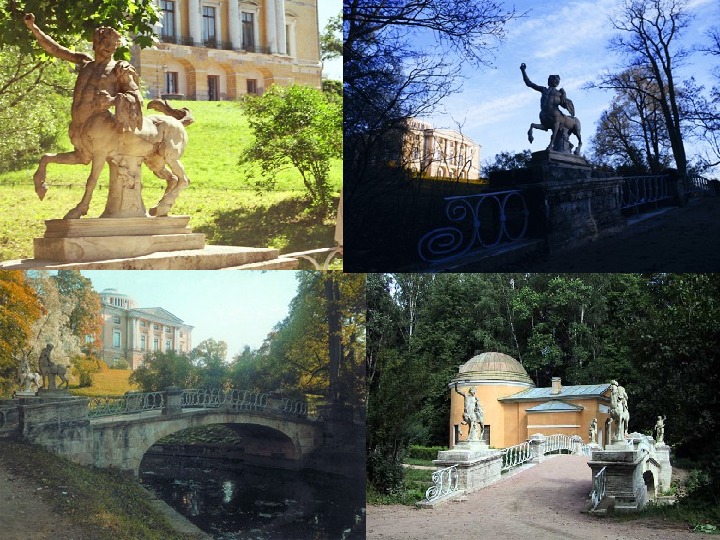
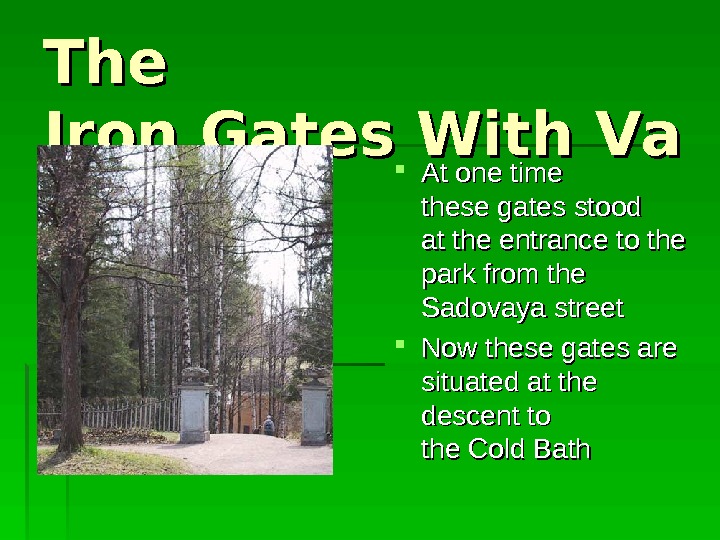
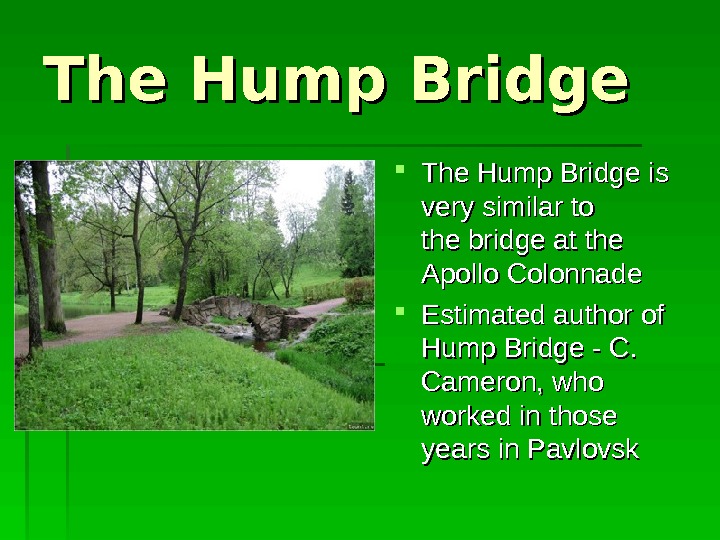

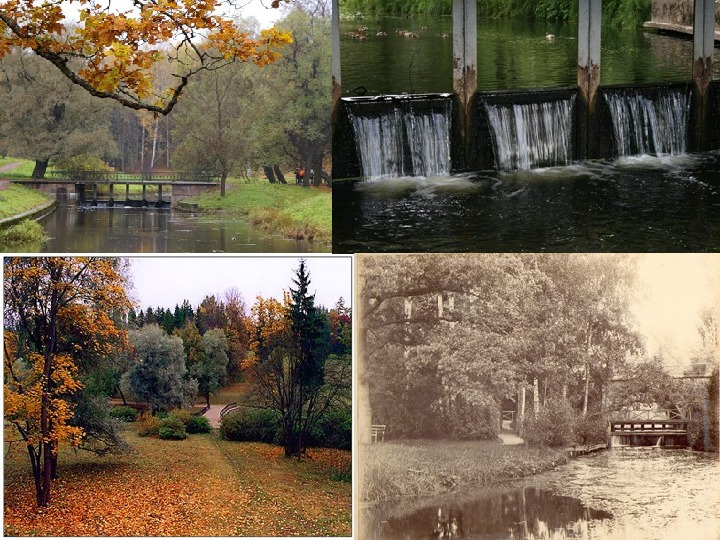
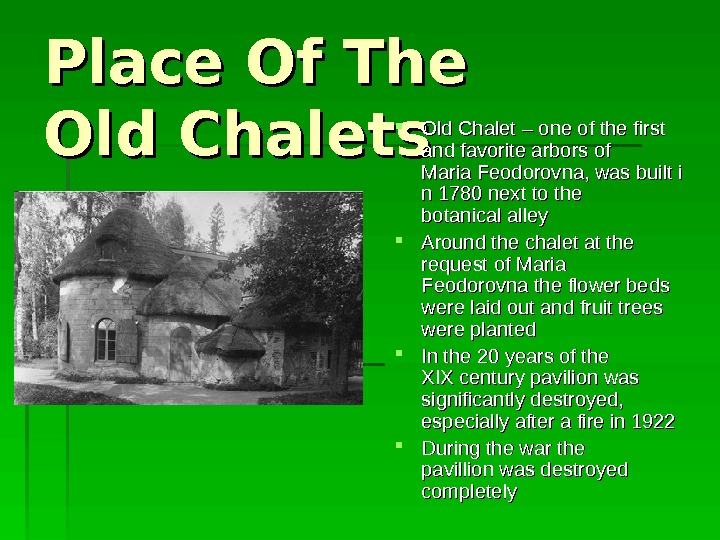
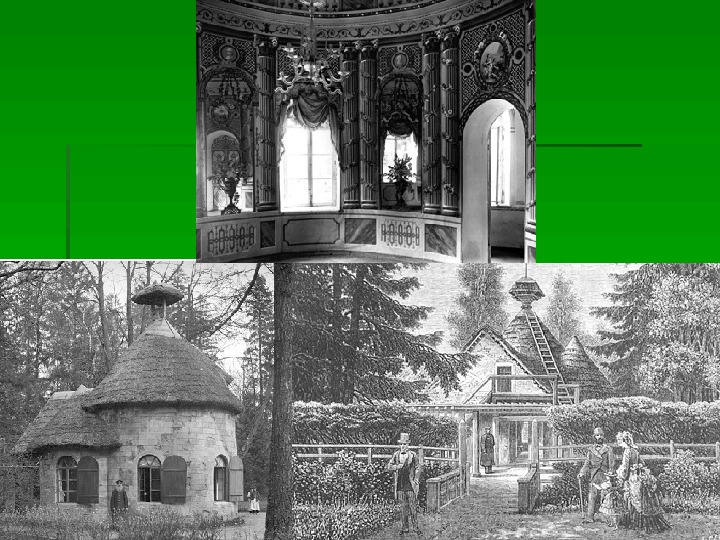

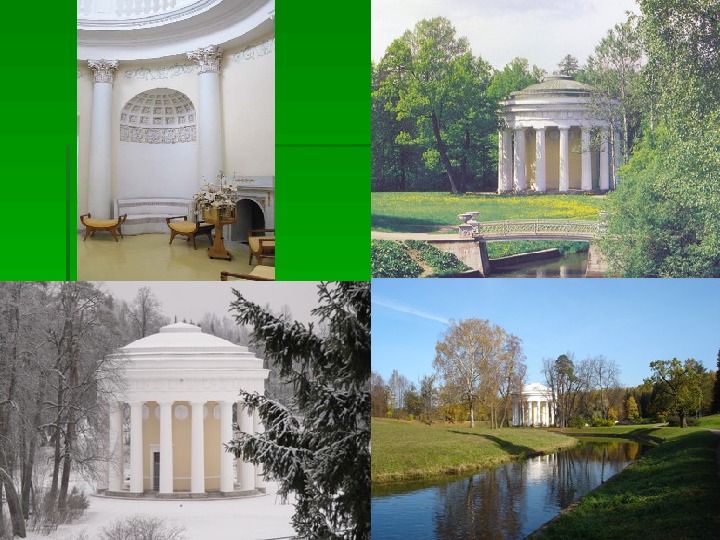
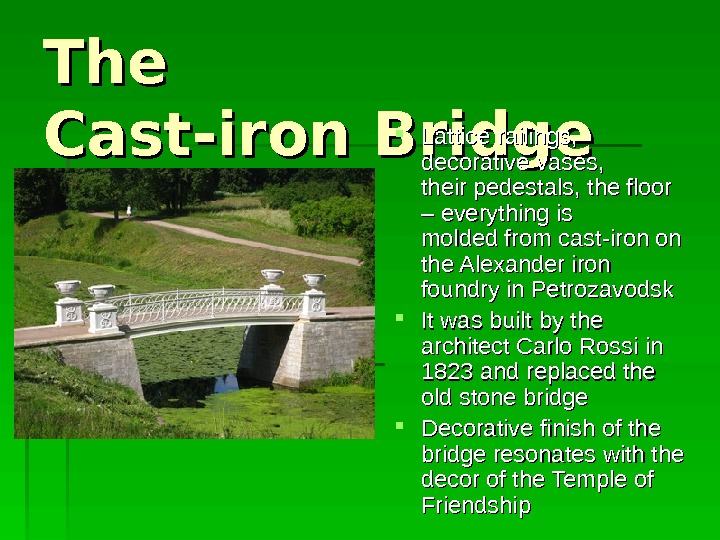
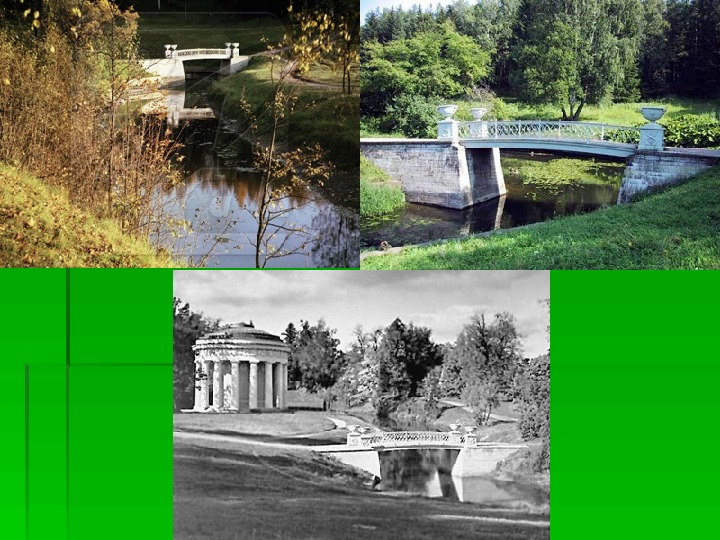
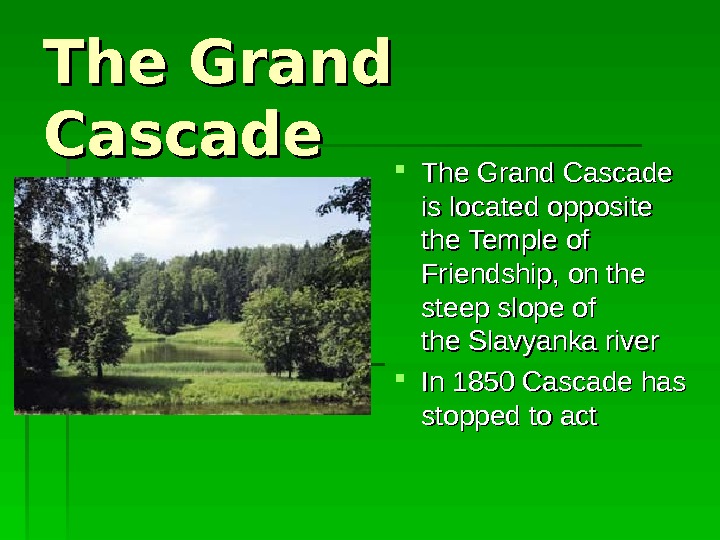
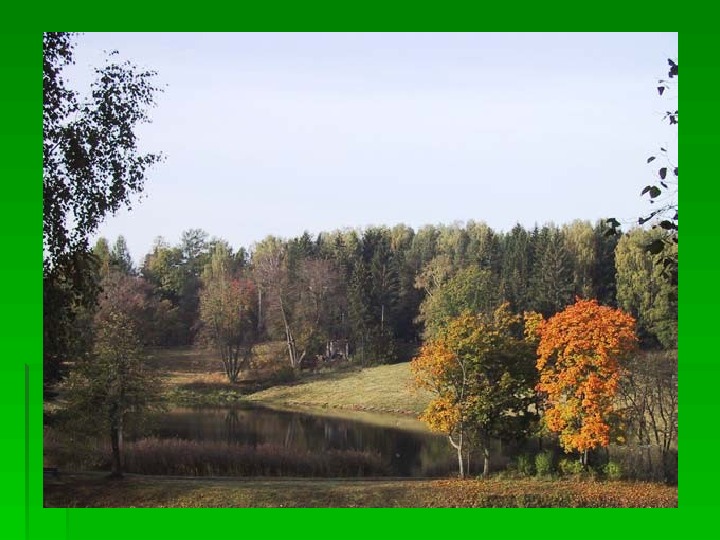

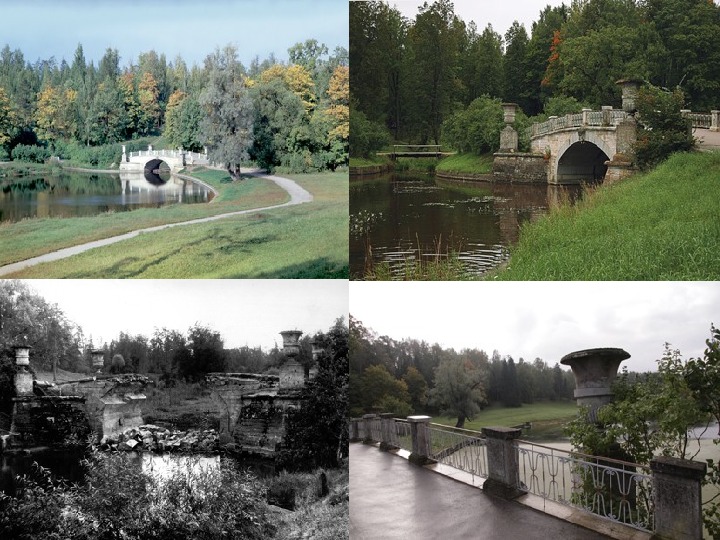
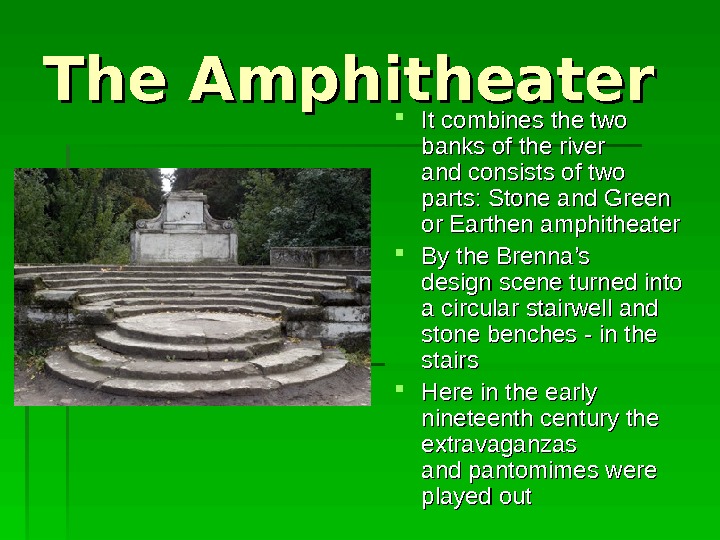
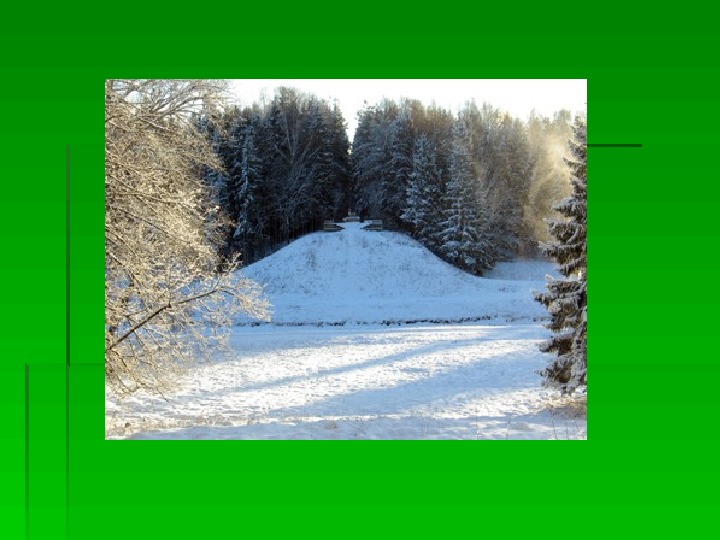

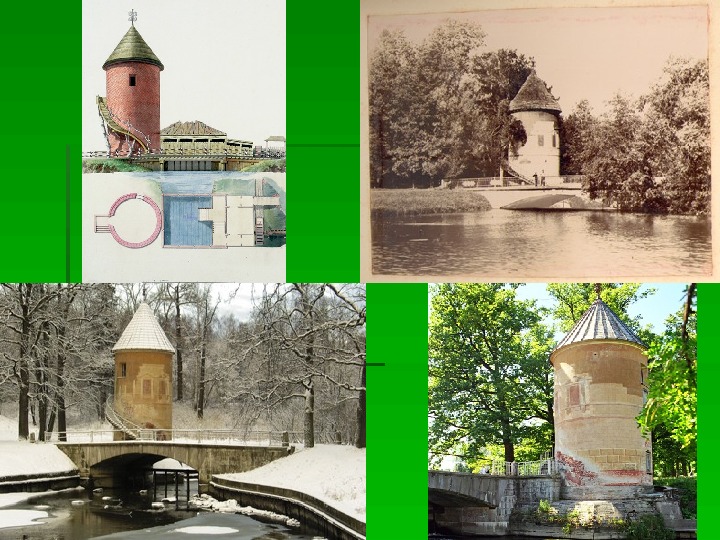
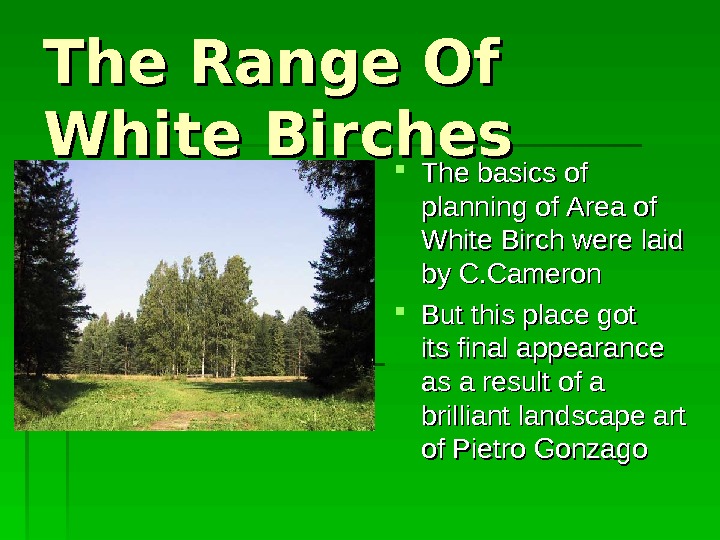
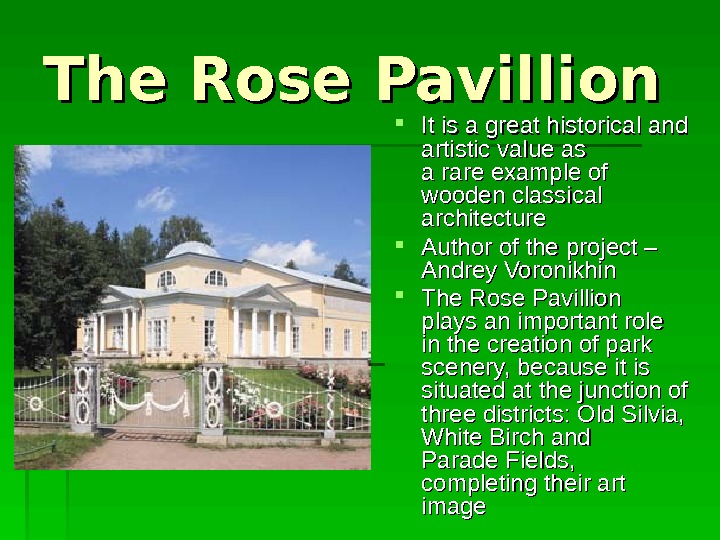
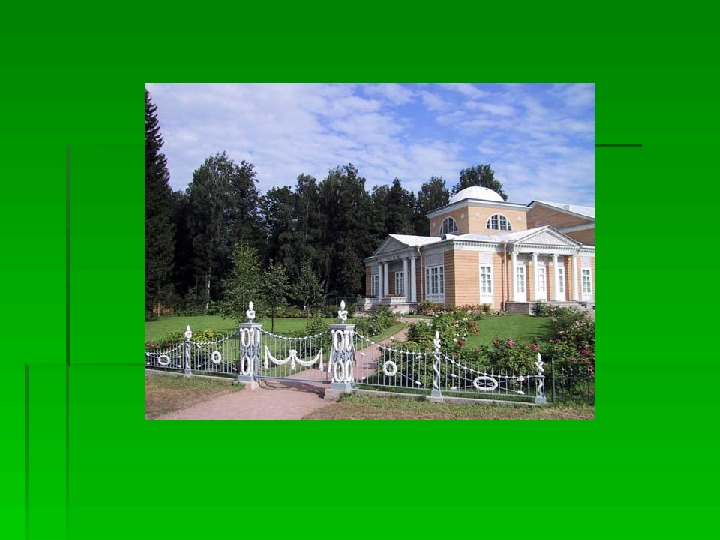
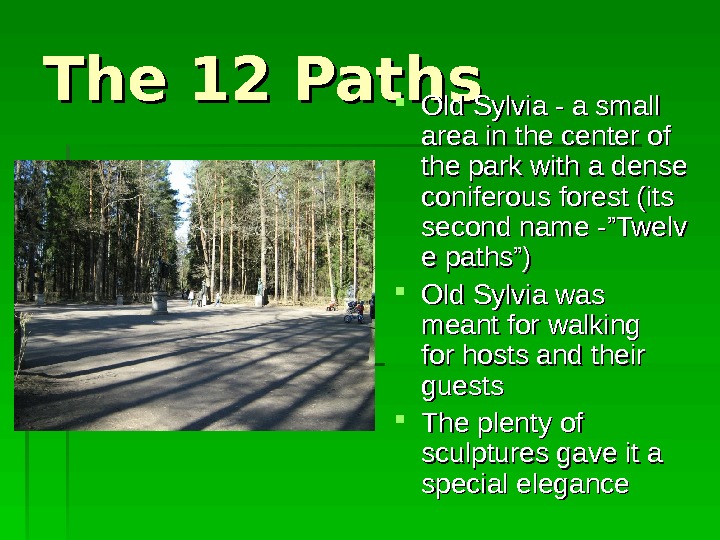
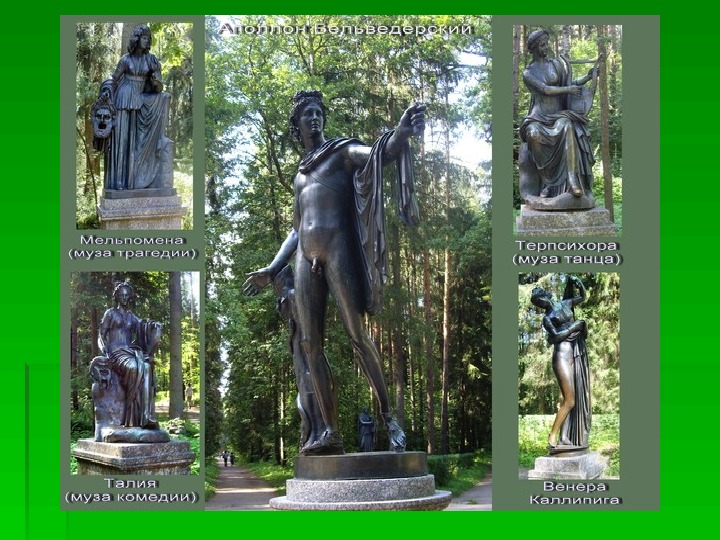
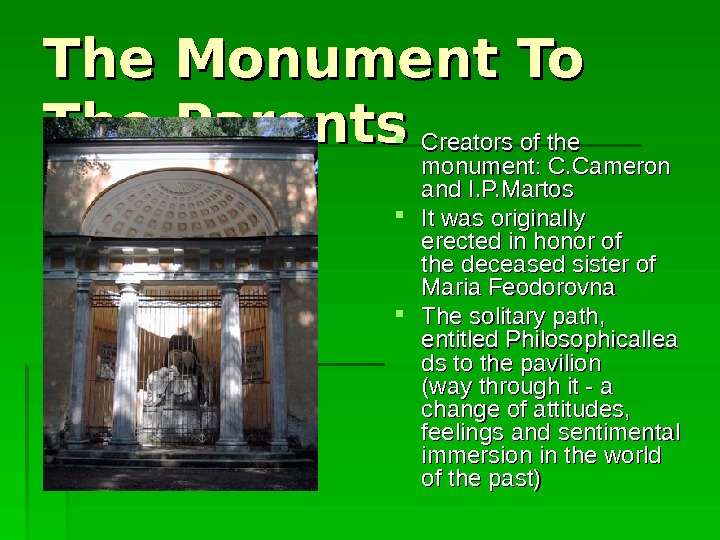
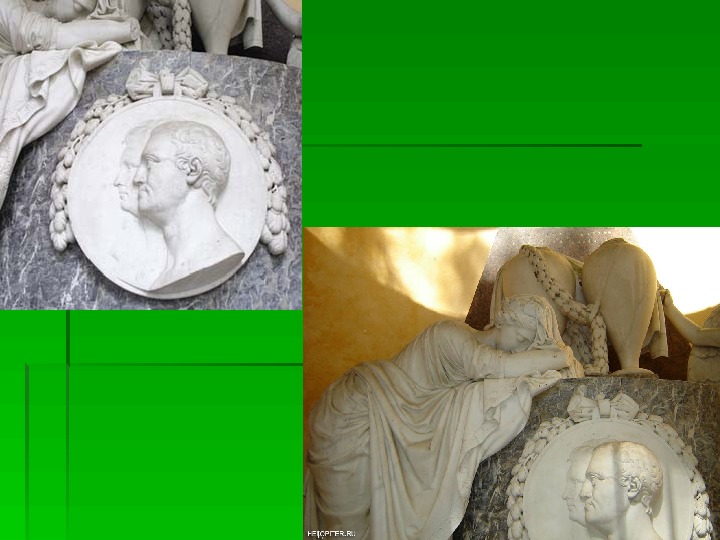
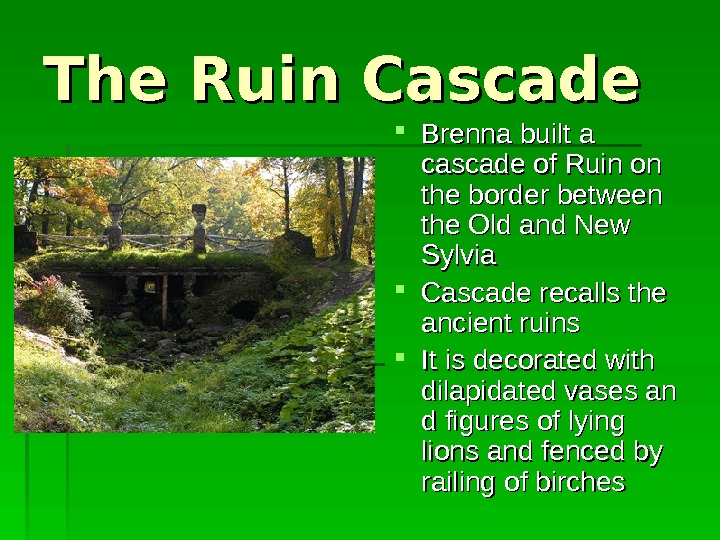
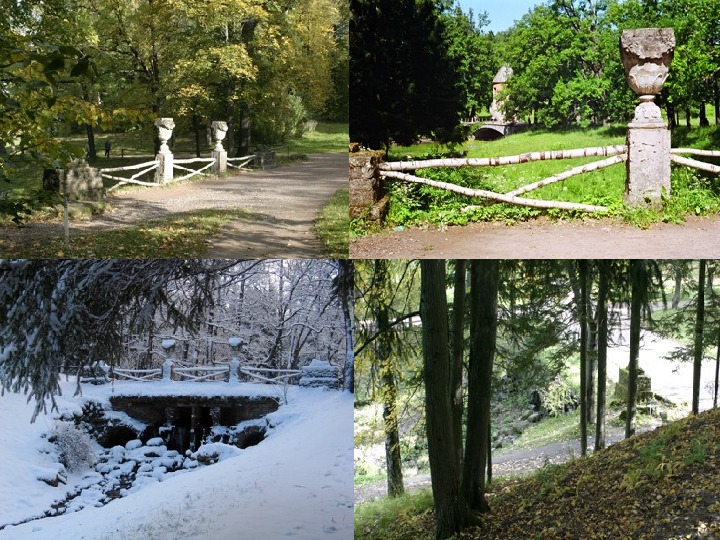
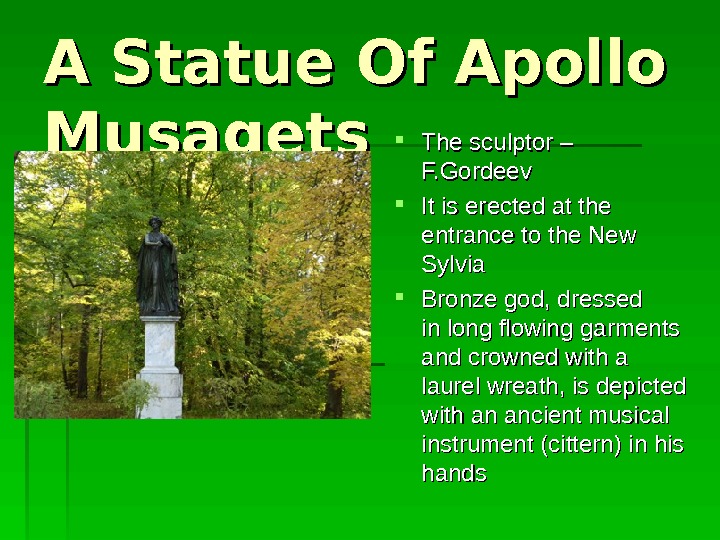

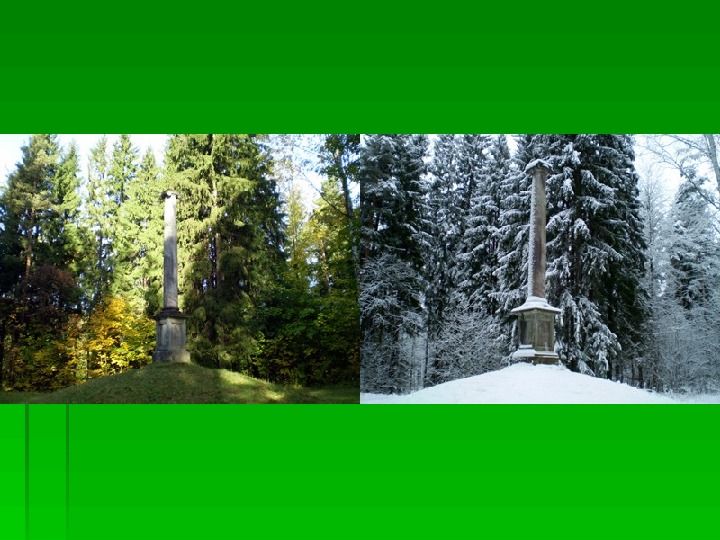
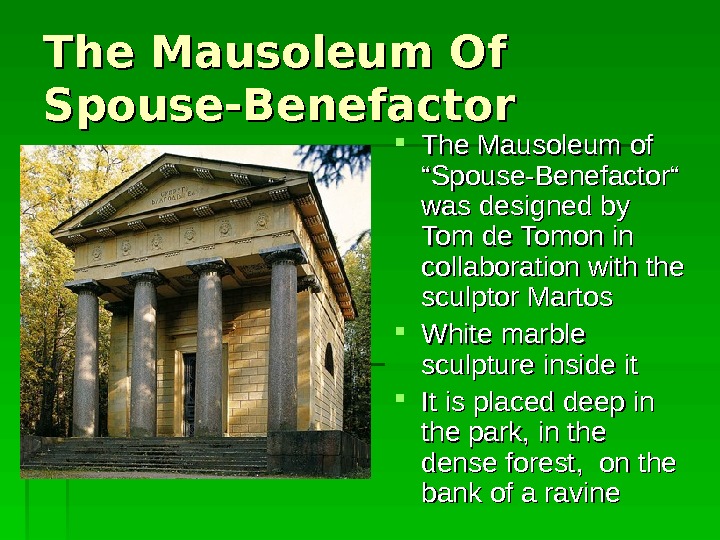
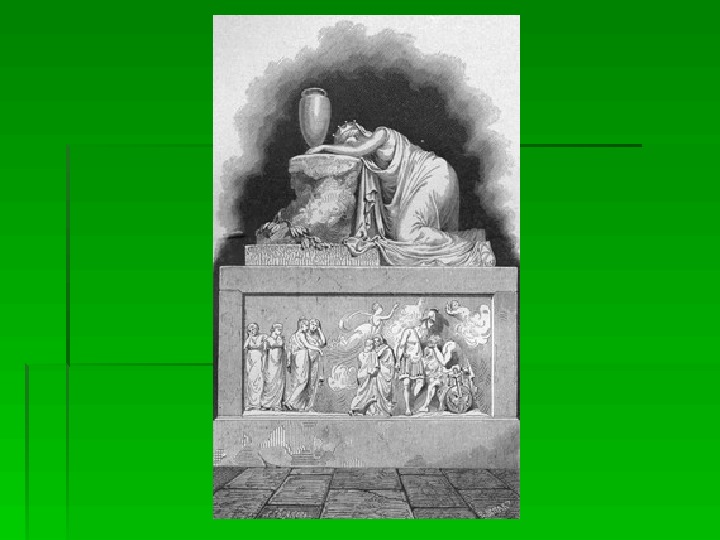
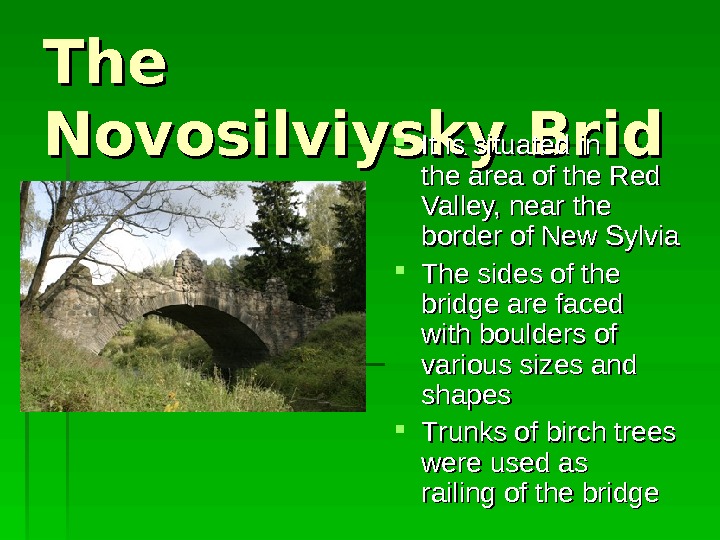
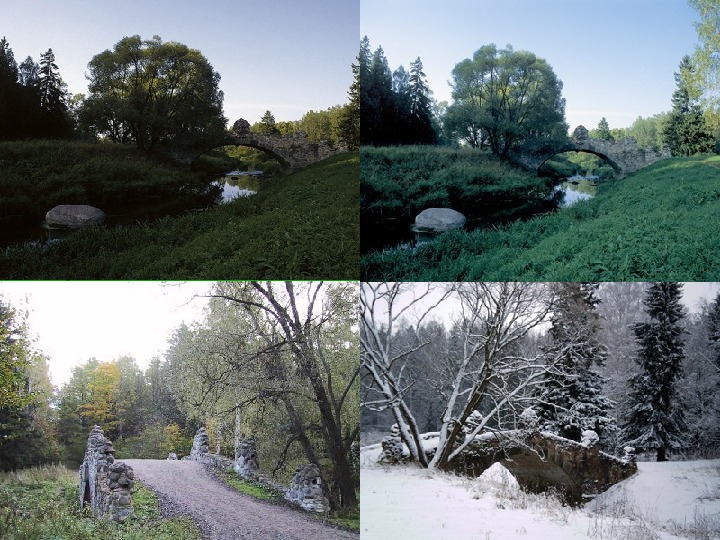
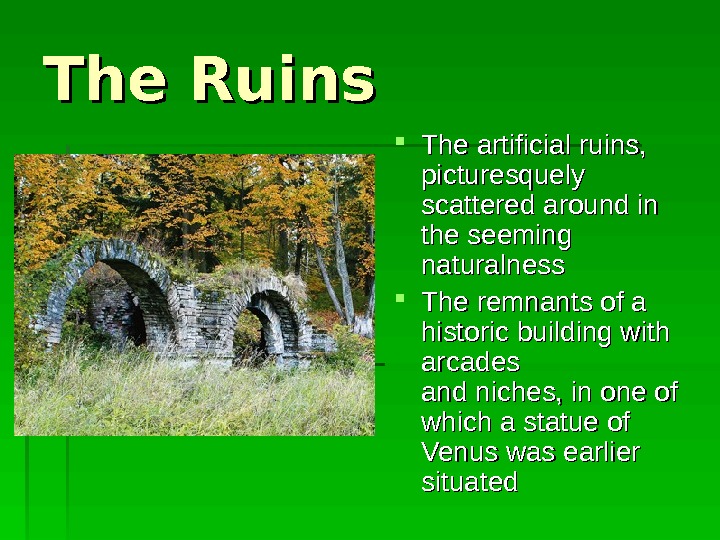
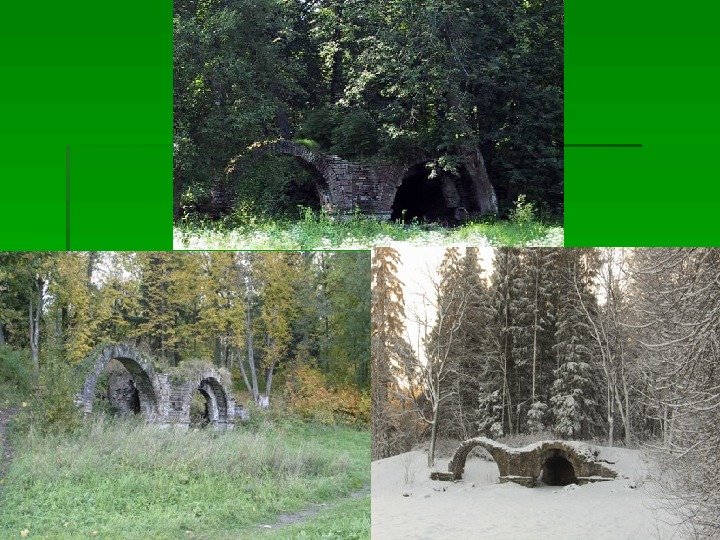
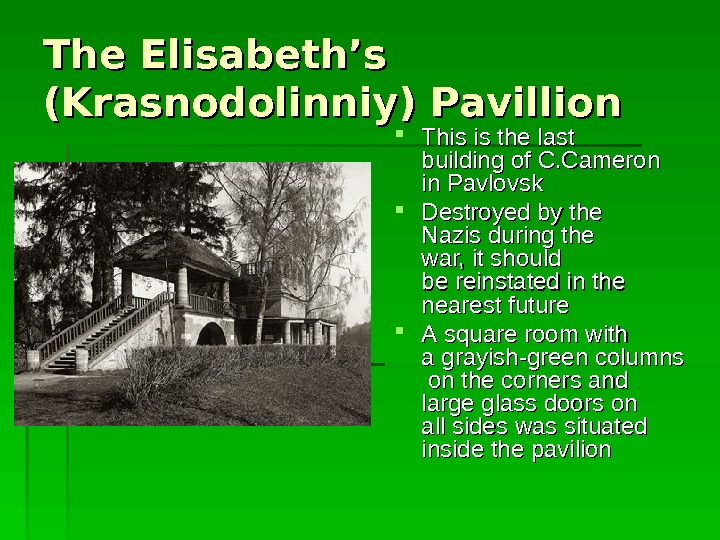
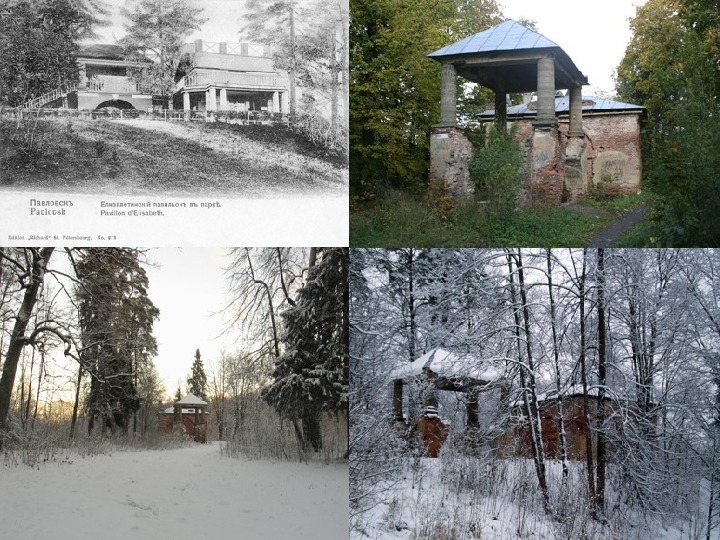
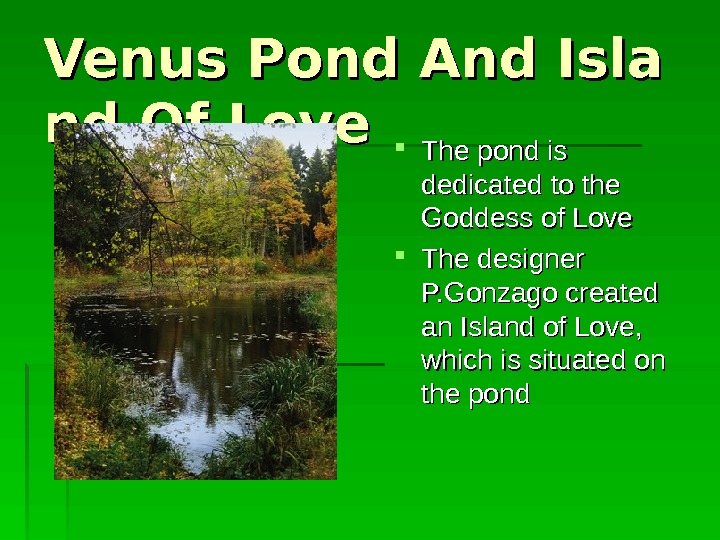
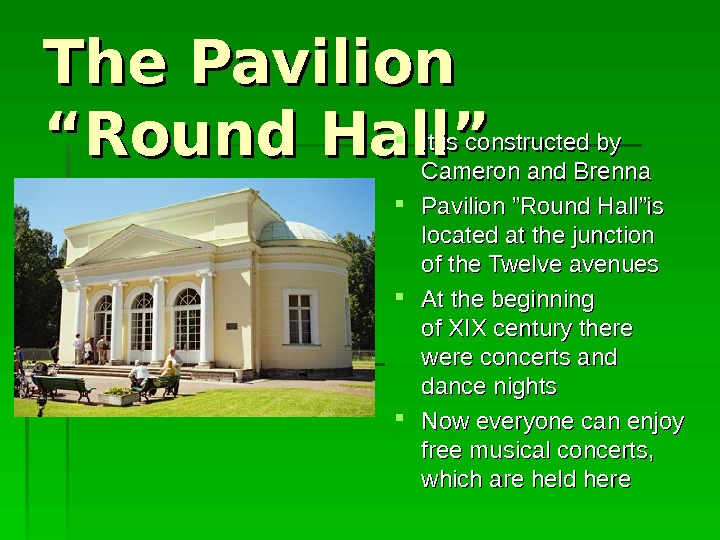
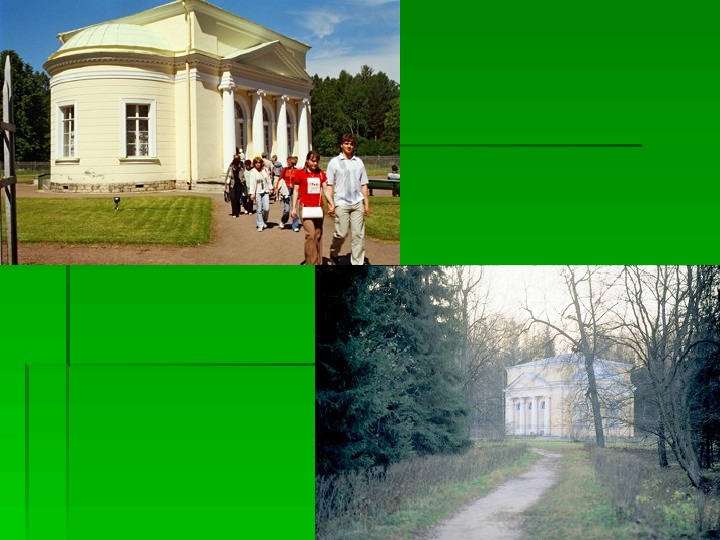

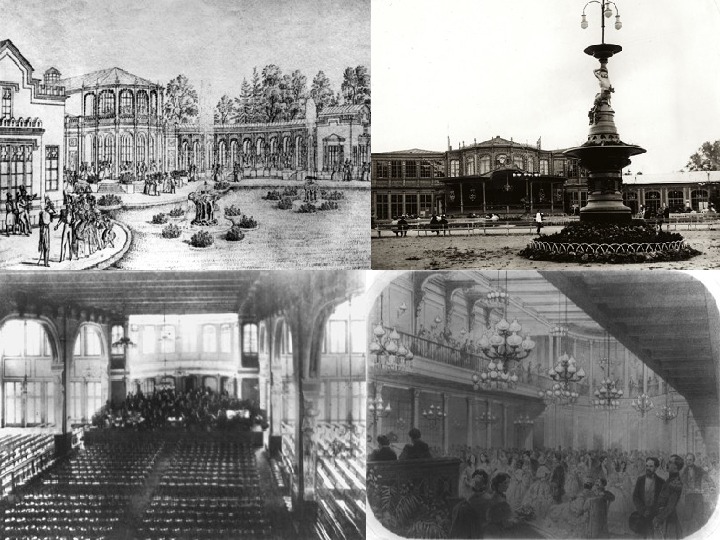

- Размер: 22 Mегабайта
- Количество слайдов: 72
Описание презентации Pavlovsk Park Pavlovsk Palace Architect – по слайдам
 Pavlovsk Park
Pavlovsk Park
 Pavlovsk Palace Architect – Charles Cameron (in 80 -ies XVIII century) It was presented to Paul I and his wife by Catherine The Great Summer residence of Paul I Brenna was involved in construction before Paul acceded to the throne The main feature of decor – white colonnade The museum hashas a a collection ofof Russian portraits, picturesque and graphic views of Pavlovsk
Pavlovsk Palace Architect – Charles Cameron (in 80 -ies XVIII century) It was presented to Paul I and his wife by Catherine The Great Summer residence of Paul I Brenna was involved in construction before Paul acceded to the throne The main feature of decor – white colonnade The museum hashas a a collection ofof Russian portraits, picturesque and graphic views of Pavlovsk

 Private Garden Private garden was created by the architect Charles Cameron and court painter Francois Violet at the same time with the construction of the palace RR egular layout of of Private Garden was created in the style of small Dutch Gardens
Private Garden Private garden was created by the architect Charles Cameron and court painter Francois Violet at the same time with the construction of the palace RR egular layout of of Private Garden was created in the style of small Dutch Gardens

 Pavilion Of Three Graces Cameron’s last work in the Pavlovsk Park Maria Feodorovna got a a magnificent gift from the elder son — the sculpture «Three. Graces» on her birthday Graces — the goddess, embodying feminine charm, beauty and joy : : Evfrosin a (Joy), Thalia (Color), Aglaia (Brilliance)
Pavilion Of Three Graces Cameron’s last work in the Pavlovsk Park Maria Feodorovna got a a magnificent gift from the elder son — the sculpture «Three. Graces» on her birthday Graces — the goddess, embodying feminine charm, beauty and joy : : Evfrosin a (Joy), Thalia (Color), Aglaia (Brilliance)

 TT riple LL inden AA lley OO ccupies a leading place in thethe composition of the Central District of the Pavlovsk Park It was used as as a main entrance to the palace
TT riple LL inden AA lley OO ccupies a leading place in thethe composition of the Central District of the Pavlovsk Park It was used as as a main entrance to the palace

 AA viary (P (P oultry HH ouse )) One of the first architectural structures, constructed by Charles Cameron Here Maria Feodoro vv na na gathere dd chamber balls, lunch and evening meals The exhibitions of artists, photographers and florists are held there
AA viary (P (P oultry HH ouse )) One of the first architectural structures, constructed by Charles Cameron Here Maria Feodoro vv na na gathere dd chamber balls, lunch and evening meals The exhibitions of artists, photographers and florists are held there

 Rossi Pavilion PP avilion was only designed by the architect and constructed only a hundred years later Sculptural monument to Maria Feodorovna
Rossi Pavilion PP avilion was only designed by the architect and constructed only a hundred years later Sculptural monument to Maria Feodorovna

 Large Circles Large circles with floral parterres and stone terraces, created by the project Vincenzo Brenna , , located near the triple l inden a a lley This is two round terraces of tufa, a little elevated above the surface WW hite marble sculpture s s ”” The World“ andand ““ Justice“ were placed i i n n the center of the terraces
Large Circles Large circles with floral parterres and stone terraces, created by the project Vincenzo Brenna , , located near the triple l inden a a lley This is two round terraces of tufa, a little elevated above the surface WW hite marble sculpture s s ”” The World“ andand ““ Justice“ were placed i i n n the center of the terraces

 A Large Stone Staircase Designed byby V. Brenna 64 steps II t connects pretty high land, where the LL arge CC ircle s are situated , with the Slavyanka valley Two pairs of lying lions, one of which is marble, and another — a cast-iron
A Large Stone Staircase Designed byby V. Brenna 64 steps II t connects pretty high land, where the LL arge CC ircle s are situated , with the Slavyanka valley Two pairs of lying lions, one of which is marble, and another — a cast-iron

 Rossi’s Arbor Original arbor-trellis , , which is surrounded by trees like bosquets inin Italian gardens Also was called as Turkish Tent
Rossi’s Arbor Original arbor-trellis , , which is surrounded by trees like bosquets inin Italian gardens Also was called as Turkish Tent
 The Milk House was built by architect Charles Cameron in 1782 in the «Swiss style» by analogy with the plan of Dairy Duke of Wurttemberg The barn, the warehouse forfor stor ageage products and the restroom, where court could drink milk, cream with a piece of black bread were situated here
The Milk House was built by architect Charles Cameron in 1782 in the «Swiss style» by analogy with the plan of Dairy Duke of Wurttemberg The barn, the warehouse forfor stor ageage products and the restroom, where court could drink milk, cream with a piece of black bread were situated here

 The Deer Bridge The bridge was built on the place of of anan oldold wooden bridge, which was named Pink Bridge In the 1920’s figures of deer ss were lost, but the name of of the bridge still remains
The Deer Bridge The bridge was built on the place of of anan oldold wooden bridge, which was named Pink Bridge In the 1920’s figures of deer ss were lost, but the name of of the bridge still remains

 The Apollo Colonnade This is one of the first buildings of Charles Cameron in Pavlovsk Originally Colonnade was situated o n n open meadow, near the Church of Mary Magdalene. 13 pairs of columns During the war the sculpture of Apollo was suffered
The Apollo Colonnade This is one of the first buildings of Charles Cameron in Pavlovsk Originally Colonnade was situated o n n open meadow, near the Church of Mary Magdalene. 13 pairs of columns During the war the sculpture of Apollo was suffered

 The Cold Bath In. In thethe XVIII century Pavlovsk hadhad a a few baths, cold bath — the latest of them AA ccordingly with the purpose of the pavilion the statues: Venus Meditseyskaya and Bather were chosen for his ornaments In 1883 the plumbing was held to the Cold Bath
The Cold Bath In. In thethe XVIII century Pavlovsk hadhad a a few baths, cold bath — the latest of them AA ccordingly with the purpose of the pavilion the statues: Venus Meditseyskaya and Bather were chosen for his ornaments In 1883 the plumbing was held to the Cold Bath

 The Centaurs Bridge Originally c entaurs were gypsum In. In 1805 architect A. Voronikhin made them marble During the Great Patriotic War the bridge was destroyed Now there are copies of Centaurs on the bridge
The Centaurs Bridge Originally c entaurs were gypsum In. In 1805 architect A. Voronikhin made them marble During the Great Patriotic War the bridge was destroyed Now there are copies of Centaurs on the bridge

 The II ronron GG ates WW ithith VV aa sesses AA t one time tt hese gates stood at the entrance to the park from the Sadovaya street Now these gates are situated at the descent to the CC old BB ath
The II ronron GG ates WW ithith VV aa sesses AA t one time tt hese gates stood at the entrance to the park from the Sadovaya street Now these gates are situated at the descent to the CC old BB ath
 The H ump Bridge The Hump BB ridge isis very similar to the bridge at the Apollo Colonnade Estimated author of of Hump Bridge — C. Cameron, who worked in those years in Pavlovsk
The H ump Bridge The Hump BB ridge isis very similar to the bridge at the Apollo Colonnade Estimated author of of Hump Bridge — C. Cameron, who worked in those years in Pavlovsk
 The Black Bridge was built after 1780 on the draft of of Charles Cameron The design of the Black Bridge is different from the other bridges in in Pavlovsk The dam is constructed uu nder the bridge In 1799 the bridge was rebuilt by V. Brenna
The Black Bridge was built after 1780 on the draft of of Charles Cameron The design of the Black Bridge is different from the other bridges in in Pavlovsk The dam is constructed uu nder the bridge In 1799 the bridge was rebuilt by V. Brenna

 Place OO f f TT he he OO ldld CC halets Old Chalet – – one of the first andand favorite arbors of of Maria Feodorovna, was built i n 1780 next to the botanical alley Around the chalet at the request of Maria Feodorovna the flower beds ww ereere laid out and fruit trees were planted In the 20 years of the XIX century pavilion was significantly destroyed, especially after a fire in 1922 During the war the pavillion was destroyed completely
Place OO f f TT he he OO ldld CC halets Old Chalet – – one of the first andand favorite arbors of of Maria Feodorovna, was built i n 1780 next to the botanical alley Around the chalet at the request of Maria Feodorovna the flower beds ww ereere laid out and fruit trees were planted In the 20 years of the XIX century pavilion was significantly destroyed, especially after a fire in 1922 During the war the pavillion was destroyed completely

 The Temple OO f. Friendship «Love, respect and gratitude dedicated» The first work of Charles Cameron in the Pavlovsk Park The Temple of Friendship built in the shape of an ancient temple rotunda with a dull exterior wall, without windows, with one oak door, surrounded by a ring of 16 columns of Greek Doric
The Temple OO f. Friendship «Love, respect and gratitude dedicated» The first work of Charles Cameron in the Pavlovsk Park The Temple of Friendship built in the shape of an ancient temple rotunda with a dull exterior wall, without windows, with one oak door, surrounded by a ring of 16 columns of Greek Doric

 The Cast-iron BB ridge Lattice railings, decorative vases, their pedestals, the floor – everything is molded from cast — iron on on the Alexander iron foundry in Petrozavodsk It was built by the architect Carlo Rossi in 1823 and replaced the old stone bridge Decorative finish of of the bridge resonates with the decor of the Temple of Friendship
The Cast-iron BB ridge Lattice railings, decorative vases, their pedestals, the floor – everything is molded from cast — iron on on the Alexander iron foundry in Petrozavodsk It was built by the architect Carlo Rossi in 1823 and replaced the old stone bridge Decorative finish of of the bridge resonates with the decor of the Temple of Friendship

 The Grand Cascade is located opposite thethe Temple of Friendship, on the steep slope of of the Slavyanka river II n 1850 Cascade has stopped to act
The Grand Cascade is located opposite thethe Temple of Friendship, on the steep slope of of the Slavyanka river II n 1850 Cascade has stopped to act

 The Visconti Bridge On one side the bridge is reflected in the mirror of water Slav anka , , on on the other – it hangs over the artificial cascade A bridge was built byby stone maker K. Visconti, author of almost all the stone buildings of the park During the war Visconti bridge was blown up
The Visconti Bridge On one side the bridge is reflected in the mirror of water Slav anka , , on on the other – it hangs over the artificial cascade A bridge was built byby stone maker K. Visconti, author of almost all the stone buildings of the park During the war Visconti bridge was blown up

 The A mphitheater It combines the two banks of the river and consists of two parts: Stone and Green oror E E arthen amphitheater By t he he Brenna’s design scene turned into a circular stairwell andand stone benches — in the stairs Here in the early nineteenth century the extravaganzas and pantomimes were played out
The A mphitheater It combines the two banks of the river and consists of two parts: Stone and Green oror E E arthen amphitheater By t he he Brenna’s design scene turned into a circular stairwell andand stone benches — in the stairs Here in the early nineteenth century the extravaganzas and pantomimes were played out

 The Pil-tower The author of the Pil-tower project is considered to to be Brenna One of the most romantic pavilions The pavillion got it’s name due to itsits elongated shape Some researchers suggest that originally «Saw Mill» was at this place
The Pil-tower The author of the Pil-tower project is considered to to be Brenna One of the most romantic pavilions The pavillion got it’s name due to itsits elongated shape Some researchers suggest that originally «Saw Mill» was at this place

 The Range Of White Birches The b asics of pp lanning of of Area of of White BB irch were laid by C. Cameron But t hishis place got itsits final appearance as a result of a brilliant landscape art ofof Pietro Gonzag oo
The Range Of White Birches The b asics of pp lanning of of Area of of White BB irch were laid by C. Cameron But t hishis place got itsits final appearance as a result of a brilliant landscape art ofof Pietro Gonzag oo
 The Rose Pavillion It. It is a great historical andand artistic value as a rare example of wooden classical architecture AA uthor of the project – Andrey Voronikhin The Rose Pavillion plays an important role inin the creation of park scenery, because it is situated at the junction of three districts: Old Silvia, White Birch andand Parade FF ield ss , , completing their artart image
The Rose Pavillion It. It is a great historical andand artistic value as a rare example of wooden classical architecture AA uthor of the project – Andrey Voronikhin The Rose Pavillion plays an important role inin the creation of park scenery, because it is situated at the junction of three districts: Old Silvia, White Birch andand Parade FF ield ss , , completing their artart image

 The 12 Paths Old Sylvia — a small area in the center of of the park with aa dense coniferous forest (its second name — ”” Twelv e e paths”) Old Sylvia was meant for walking forfor hosts and their guests The plenty of sculptures gave it a special elegance
The 12 Paths Old Sylvia — a small area in the center of of the park with aa dense coniferous forest (its second name — ”” Twelv e e paths”) Old Sylvia was meant for walking forfor hosts and their guests The plenty of sculptures gave it a special elegance

 The Monument To The Parents Creators of the monument: C. Cameron and I. P. Martos It was originally erected in honor of the deceased sister ofof Maria Feodorovna The solitary path , , entitled Philosophicallea ds to the pavilion (w(w ay through it — a change of attitudes, feelings and sentimental immersion in the world of the past ))
The Monument To The Parents Creators of the monument: C. Cameron and I. P. Martos It was originally erected in honor of the deceased sister ofof Maria Feodorovna The solitary path , , entitled Philosophicallea ds to the pavilion (w(w ay through it — a change of attitudes, feelings and sentimental immersion in the world of the past ))

 The Ruin. Cascade Brenna built a a cascade of Ruin o o n n thethe border between thethe Old andand New Sylvia Cascade recalls the ancient ruins It is decorated with dilapidated vases an dd figures of lying lions and fenced by by railing ofof birches
The Ruin. Cascade Brenna built a a cascade of Ruin o o n n thethe border between thethe Old andand New Sylvia Cascade recalls the ancient ruins It is decorated with dilapidated vases an dd figures of lying lions and fenced by by railing ofof birches

 A SA S tatue O O ff Apollo Mu. Mu sagets The sculptor – F. Gordeev It is erected at the entrance to the New Sylvia Bronze god, dressed in long flowing garments and crowned with a laurel wreath, is depicted with an ancient musical instrument (( cittern )) in his hands
A SA S tatue O O ff Apollo Mu. Mu sagets The sculptor – F. Gordeev It is erected at the entrance to the New Sylvia Bronze god, dressed in long flowing garments and crowned with a laurel wreath, is depicted with an ancient musical instrument (( cittern )) in his hands
 The Column “Doomsday” The column was designed by CC. . Cameron Originally the column was installed at the end of the Triple Li. Li nden AA lley It is erect ed on a large artificially created circular earthen hill
The Column “Doomsday” The column was designed by CC. . Cameron Originally the column was installed at the end of the Triple Li. Li nden AA lley It is erect ed on a large artificially created circular earthen hill

 The Mausoleum Of Of Spouse-Benefactor The Mausoleum of ““ SS pouse- BB enefactor“ was designed by Tom de Tomon in collaboration with the sculptor Martos WW hite marble sculpture inside it It is placed deep in the park, in the dense forest , on the bank of a ravine
The Mausoleum Of Of Spouse-Benefactor The Mausoleum of ““ SS pouse- BB enefactor“ was designed by Tom de Tomon in collaboration with the sculptor Martos WW hite marble sculpture inside it It is placed deep in the park, in the dense forest , on the bank of a ravine

 The Novosilviysky. Brid gege II t is situated i n n the area of the Red Valley, near the border of New Sylvia The sides of the bridge are faced with boulders of various sizes and shapes TT runks of birch trees were used as railing of the bridge
The Novosilviysky. Brid gege II t is situated i n n the area of the Red Valley, near the border of New Sylvia The sides of the bridge are faced with boulders of various sizes and shapes TT runks of birch trees were used as railing of the bridge

 The Ruins The artificial ruins , , picturesquely scattered around in the seeming naturalness The remnants ofof aa historic building with arcades and niches, in in one of which a statue of Venus was earlier situated
The Ruins The artificial ruins , , picturesquely scattered around in the seeming naturalness The remnants ofof aa historic building with arcades and niches, in in one of which a statue of Venus was earlier situated

 The Elisabeth’s (Krasnodolinniy) Pavillion This is the last building of of CC. . Cameron in Pavlovsk Destroyed by the Nazis during the war, itit should be reinstated in the near estest future AA square room with a grayish-green columns on the corners and large glass doors on all sides was situated ii nside the pavilion
The Elisabeth’s (Krasnodolinniy) Pavillion This is the last building of of CC. . Cameron in Pavlovsk Destroyed by the Nazis during the war, itit should be reinstated in the near estest future AA square room with a grayish-green columns on the corners and large glass doors on all sides was situated ii nside the pavilion

 Venus. Pond AA nd. Isla ndnd OO f Love The pond is dedicated to the GG oddess of LL oveove The d esigner P. Gonzag oo created an an Island of Love , , which is situated on the pond
Venus. Pond AA nd. Isla ndnd OO f Love The pond is dedicated to the GG oddess of LL oveove The d esigner P. Gonzag oo created an an Island of Love , , which is situated on the pond
 The Pavilion “Round Hall” It is constructed by Cameron and Brenna Pavilion ”” Round Hall ”” is is located at the junction of the Twelve avenues At the beginning of XIX century there were concerts andand dance nights Now everyone can enjoy free musical concerts, which are held here
The Pavilion “Round Hall” It is constructed by Cameron and Brenna Pavilion ”” Round Hall ”” is is located at the junction of the Twelve avenues At the beginning of XIX century there were concerts andand dance nights Now everyone can enjoy free musical concerts, which are held here

 The Place Of Music Station Pavlovsk concert hall was called as the first Russian Philharmonic Orchestra and a musical oasis of St. Petersburg Very famous composers were playing inside the Music Station Place for public concerts, balls and masquerade balls, dance evenings etc.
The Place Of Music Station Pavlovsk concert hall was called as the first Russian Philharmonic Orchestra and a musical oasis of St. Petersburg Very famous composers were playing inside the Music Station Place for public concerts, balls and masquerade balls, dance evenings etc.

 THANKS FOR YOUR ATTENTION!
THANKS FOR YOUR ATTENTION!

